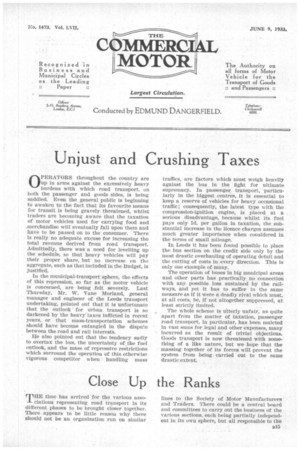Unjust and Crushing Taxes
Page 29

If you've noticed an error in this article please click here to report it so we can fix it.
OPERATORS throughout the country are up in arms against the excessively heavy burdens with which • road transport. on both the passenger and goods sides, is being. saddled. Even the general public is beginning to awaken to the fact that its favourite means for transit is being gravely threatened, • whilst traders are becoming aware that the taxation of motor vehicles used for carrying food and merchandise will eventually fall upon them and have to be passed on to the consumer. There is really no adequate excuse for increasing the total revenue derived from road transport. Admittedly, there was a need for levelling up the schedule, so that heavy vehicles will pay their proper share, but no increase on the aggregate, such as that included in the Budget, is justified.
In the municipal-transport sphere, the effects of this repression, so far as the motor vehicle is concerned, are being felt severely. Last Thursday, Mr. W. Vane Morland, general manager and engineer of the Leeds transport undertaking, pointed out that it is unfortunate that the outlook for urban transport is so darkened by the heavy taxes inflicted in recent years, or that mass-transportation schemes should have become entangled in the dispute between the road and'rail interests.
He also pointed out that the tendency sadly to overtax the bus, the uncertainty of the fuel outlook, and the mass of repressive restrictions which surround the operation of this otherwise vigorous competitor when handling mass traffics, are factors which must weigh heavily against the bus in the fight for ultimate supremacy. In passenger transport, particularly in the biggest centres, it is essential to keep a reserve of vehicles for heavy occasional traffic ; consequently, the latest type with the compression-ignition engine, is placed at a serious disadvantage, because whilst its fuel pays only 1.d. per gallon in taxation, the substantial increase in the licence charges assumes much greater Importance when considered in the terms of small mileage.
In Leeds it has been found possible to place the bus section on the credit side only by the most drastic overhauling of operating detail and the cutting of costs in every direction. This is only one example of many.
The operation of buses in big municipal areas and other parts has practically no connection with any possible loss sustained by the railways, and yet it has to suffer in the same measure as if it were a deadly rival which must, at all costs, be, if not altogether suppressed, at least strictly limited.
The whole scheme is utterly unfair, as quite apart from the matter of taxation, passenger road transport, in particular, has been mulcted in vast sums for legal and other expenses, many incurred as the result of trivial objections. Goods transport is now threatened with something of a like nature, but we -hope that the massing together of its forces will -prevent the system from being carried out to the same drastic extent.




























































































